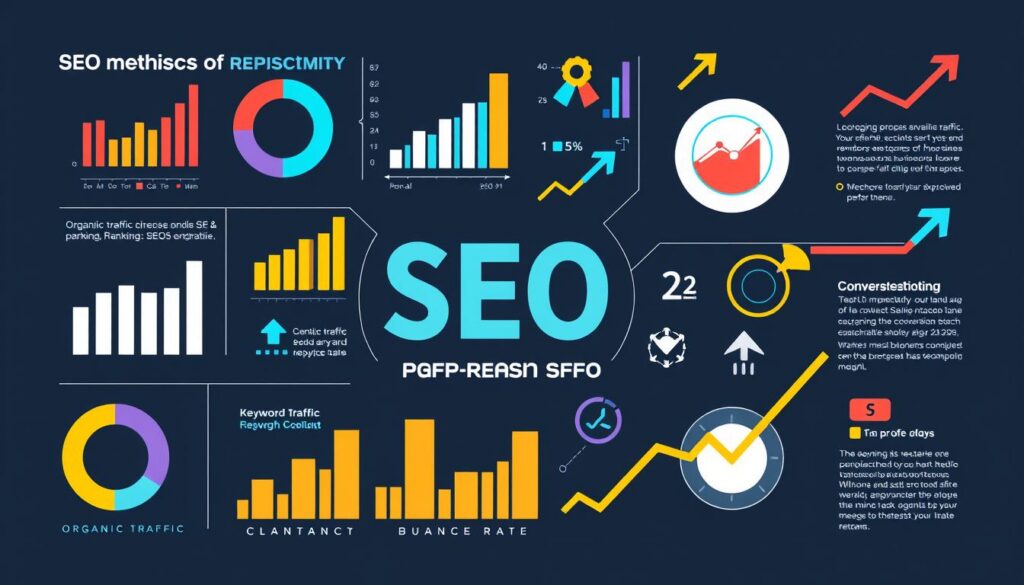In today’s digital world, streamlining SEO reporting and analytics is key to a startup’s success. The online search environment is always changing. Startups that focus on detailed SEO analytics are far more likely to lead in their market. By using automated SEO reports, startups show they are focused on growth. They make sure every choice is backed by solid data and in-depth analysis.
SEO reporting software is vital in today’s digital marketing. It helps understand user actions and tailor content to boost sales. Tools like Google Analytics and Google Search Console let businesses track their progress efficiently. This saves time and money, allowing for focus on new strategies. Also, proving ROI is crucial nowadays. The data from SEO analytics is priceless for showing how well SEO efforts are working.
Key Takeaways
- Engaging in SEO analytics is crucial for startups aiming to surpass competitors.
- Automated SEO reporting saves resources and facilitates strategic decisions.
- SEO reporting software like Google Analytics is instrumental for tracking user interactions and performance.
- Regular analytics review is recommended for adaptive and proactive SEO strategy.
- Customized and automated reports cater to the unique needs of each project and client.
- Effective SEO analytics translate into better customer engagement, higher conversions, and increased ROI.
- Foundational SEO analytics are essential for tracking key performance metrics and developing actionable insights.
Understanding SEO Reporting and Analytics
In today’s digital world, using seo analytics tools to gather data is key. This data helps businesses understand how to make their websites perform better. With a good grasp of SEO analytics and reporting, companies can make their online strategies better.
What is SEO Reporting?
SEO reporting is crucial for measuring the success of online strategies. It involves using tools like Google Analytics to track traffic and rankings. This data helps businesses tweak their SEO for better results.
The Importance of SEO Analytics
Seo data analysis reveals what users like on a website. This knowledge is gained by studying how long visitors stay and what they look at. Understanding these insights helps create content that brings in more visitors.
Tools like Ahrefs and Semrush are vital for staying competitive. They give businesses data on how they compare to others. This is key for staying ahead in the industry.
| Tool | Functionality | Key Benefit |
|---|---|---|
| Google Analytics | Tracks traffic, user behavior | Improves customer engagement through behavior analysis |
| Google Search Console | Monitors keyword performance, indexing issues | Enhances site’s search engine compatibility |
| Semrush | Keyword research, competitive insights | Steers enhanced keyword strategies and competitor benchmarking |
| Ahrefs | Backlink and keyword analysis | Strengthens off-page SEO and supports robust backlink strategy |
| Screaming Frog | SEO audit tool for technical issues | Identifies and resolves on-page technical SEO problems |
Effective SEO reporting lets businesses continuously optimize their online presence. This process leads to both quick wins and long-term success.
Key Metrics for SEO Performance
Understanding how your SEO efforts perform is vital. To do this, focus on important seo performance metrics. These not only show how well your strategies work but also help decide what to do next. Key aspects should be checked regularly using an seo reporting dashboard.
Organic Traffic and Bounce Rates
Organic traffic measures the number of visitors coming from non-paid searches. If your organic traffic is high, it means your content matches what people are searching for. It’s also crucial to look at details like where these visitors are from and what devices they use.
Bounce rate tells you how many visitors leave after seeing just one page. A lower rate means your site is more engaging. This could also improve your rankings as it signals to search engines that users find your content valuable.
Keyword Ranking Efficiency
Knowing where your site stands in search results for key terms is a clear measure of SEO success. Being in the top 5 is crucial as most people look no further. Watching how these rankings change helps you understand if your SEO approaches work.
Conversion Tracking
Conversion rates show how often visitors complete desired actions, like buying something. Watching these rates, especially from organic traffic, shows SEO’s true value. Tools like Google Analytics offer in-depth insights, helping you see which strategies are most effective.
Overall, to better your SEO, track and analyze seo performance metrics such as organic traffic, keyword rankings, bounce rates, and conversion rates. Using a detailed seo reporting dashboard, you can refine your approach and grow your business.

Tools to Streamline SEO Reporting
Many tools help make SEO management easier and more effective. They are crucial in following seo reporting best practices. Tools also support automated seo reporting. This helps track and analyze data well. It leads to better rankings, more traffic, and higher conversions.
Popular SEO Reporting Tools
Google Analytics provides insights into user behavior and traffic. Ahrefs is great for backlink and keyword info. SEMrush offers extensive features for SEO, content, and social media. Each tool has unique benefits, like better keyword and traffic insights. This gives a full picture of a site’s success.
Comparing Free vs. Paid Tools
Free tools like Google Analytics track visitors and conversions but might lack advanced features. For deeper analysis and bigger campaigns, advanced features are key. Paid platforms like Ahrefs and SEMrush offer more data and detailed reports. With a payment, you can see competitor data and monitor your site continuously. For example, Ahrefs starts with a small fee.
| Tool | Features | Price Range (per month) |
|---|---|---|
| Google Analytics | Real-time data, Conversion tracking | Free |
| Ahrefs | Backlink analysis, Keyword tracking | $29 – $399 |
| SEMrush | Comprehensive SEO suite, Social media analytics | Bespoke pricing |
| SuferSEO | Content analysis, Keyword research | $69 – Custom pricing |
| ReportGarden | Data integration, Customizable reports | $74 – $249 |
Choosing between free or paid tools depends on your SEO needs and goals. Each tool has its own advantages. The best choice works well with your current processes. It should also improve automated seo reporting. This means clearer performance metrics.
Best Practices for Effective Reporting
In the SEO world, following the best practices for reporting makes your data both meaningful and actionable. Integrating seo data analysis greatly improves strategic planning and decision-making in organizations.
Setting Clear Goals and KPIs
Defining clear goals and key performance indicators (KPIs) is crucial for effective SEO reporting. These metrics can include growth in organic traffic, better conversion rates, and keyword rankings improvements. Focusing on these helps direct SEO efforts to meet specific business objectives. It ensures everyone understands the goals and the strategies’ logic.
Visualizing Data for Better Insights
Using visual tools like graphs, heatmaps, and dashboards is key to simplify complex seo data analysis. These tools help share the data’s story, making it simpler for teams and clients to see trends and outliers quickly.
Regularly Updating Reports
Since SEO is always changing, it’s vital to keep reports up to date. This captures shifts in search engines and how people use them. Doing so keeps your strategy relevant and ensures decision-makers have the latest data for smart choices.
Here’s a table showing key SEO metrics to watch and report regularly for better performance:
| Metric | What It Measures | Why It’s Important |
|---|---|---|
| Organic Traffic | Number of visitors from search engines | Indicates effectiveness of SEO in attracting visitors |
| Keyword Rankings | Position in search engine results for specific keywords | Reflects visibility and effectiveness of SEO content |
| Bounce Rate | Percentage of visitors who leave after viewing only one page | Helps evaluate content relevance and user engagement |
| Conversion Rate | Percentage of visitors who complete a desired action | Measures success of website in achieving business goals |
| Backlinks | Links from other sites pointing to your website | Enhances site authority and improves search rankings |

Analyzing Results to Drive SEO Strategy
Today’s world is driven by data. Analyzing SEO results well helps shape strong strategies. These strategies boost a website’s visibility and user engagement. Tools like Google Analytics and Google Tag Manager provide lots of data. This data helps businesses see changes and trends. Understanding these trends leads to better SEO reporting and more success.
Interpreting Data Trends
Looking at metrics like organic search traffic and bounce rates is insightful. For instance, more organic search traffic shows good keyword use and content relevance. But a high bounce rate might mean the content isn’t engaging enough. This requires quick strategy changes.
Making Informed Decisions
Improving SEO reporting means making data analysis a routine. Long session durations show valuable content and high engagement. This ties to conversion rates, showing how well the site keeps potential customers. Businesses can then adjust their content strategy. This boosts expectations, increases conversions, and improves SEO investment returns.
| Metric | Importance | Impact on SEO Strategy |
|---|---|---|
| Organic Search Traffic | Core indicator of SEO success | Guides keyword and content optimization |
| Bounce Rate | Measures content relevance and user experience | Signals need for content or UX adjustments |
| Keyword Rankings | Affects visibility and organic discovery | Directs ongoing SEO focus and efforts |
| Conversion Rates | Connects SEO efforts with business outcomes | Helps evaluate and refine user journey paths |
To improve SEO reporting, use detailed data analysis. This helps make fast, informed decisions for strategy tweaks. By making seo reporting best practices a daily habit, businesses can keep their SEO efforts fresh. This keeps them in line with changing trends and user needs.
Future Trends in SEO Reporting and Analytics
We are entering a new era with SEO reporting and analytics. Thanks to technology, big changes are coming. The use of AI in SEO is growing fast. It’s making us rethink how we work with digital data. By 2030, the AI market could hit two trillion U.S. dollars. This growth will change SEO greatly, leading to more automated and precise strategies.
The Role of AI in SEO Reporting
AI is making SEO tools much better at understanding complex data and improving search predictions. This is very important now. A lot of mobile searches don’t lead to clicks, as the Semrush study showed. With AI, like Google’s SGE, we need to tell SEO stories differently. This is vital for staying visible online today.
Predictive Analytics for SEO Strategy
Predictive analytics is changing SEO from reactive to proactive. It’s not just about site health anymore. It’s about looking ahead. This helps strategists get ready for changes in search habits and algorithms. By focusing on the future, we can keep our SEO methods effective and competitive.
FAQ
How can I streamline SEO reporting and analytics?
Streamlining SEO reporting is easy with automated tools. These tools collect data and create reports for you. Google Analytics, Google Search Console, SEMrush, and Ahrefs make it much simpler. They set up dashboards for quick insights and highlight key metrics.
Why is SEO reporting important?
SEO reports show how your website performs in search results. They highlight successful areas and places to improve. This information helps you refine your SEO efforts for better results.
What are the key benefits of SEO analytics?
SEO analytics offer insights into user actions and site issues. They reveal trends over time. This information guides you to make better decisions and prioritize SEO tasks successfully.
Which metrics are critical for SEO performance?
Essential metrics include organic traffic and bounce rates. Also, keyword rankings and conversion rates are crucial. They help you understand visitor actions and gauge your campaign’s success.
What are the differences between free and paid SEO reporting tools?
Free tools like Google Analytics give basic insights for starters. Paid tools like SEMrush and Ahrefs offer detailed analyses. They give in-depth reports on backlinks, content, and competitors.
How can I ensure effective SEO reporting?
To report SEO effectively, set clear goals and KPIs. Use visual data for easy understanding. Keep your reports updated to show the latest data. This focus will lead to better results.
How does regular data analysis impact SEO strategy?
Regular analysis of SEO data reveals trends. This helps make informed choices. Understanding the reasons behind data helps you improve your strategies for better engagement.
What is the future of SEO reporting and analytics?
The future of SEO reporting will use advanced AI and predictive analytics. These tools will offer deeper insights and foresee trends. Such foresight will improve strategy adjustments proactively.
What role will AI play in SEO reporting in the future?
AI will greatly speed up data processing in SEO reporting. It will uncover complex patterns and predict outcomes. This lets SEO pros focus on strategy over manual data analysis.
How can predictive analytics influence future SEO strategy?
Predictive analytics will foresee trends using current data. This allows SEO strategists to prepare for market shifts. They’ll be able to stay ahead and match upcoming user behaviors.



